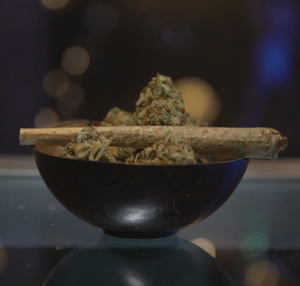Marijuana Use: Dangerous and Against Torah?
In my therapy practice, I’ve witnessed firsthand how marijuana ruins individuals and marriages. Its addictive nature makes it extremely difficult for users to stop despite the damage it causes to their lives. The struggle to become clean and reclaim a healthy lifestyle that doesn’t harm oneself or loved ones can be overwhelming.
Since a person can never know how they will respond to a powerful mind-altering drug or whether they may become addicted, the use of marijuana should be avoided completely, even for recreational purposes. If someone is already using marijuana, they need to be cautious, using it in moderation and responsibly, while being honest with themselves to ensure they don’t slide into dependency.
Breaking this habit is possible, even after years of use. Many recovering from marijuana addiction require outside help—whether from specialized addiction counselors or formal rehabilitation programs lasting weeks or months.

What does Torah say about harmful substances?
The Torah clearly prohibits actions that injure one’s body or impede the ability to perform mitzvos. An individual needs a healthy body to perform mitzvos, and there are numerous mitzvos between one person and another. Injuring one’s body compromises the ability to perform the mitzvos and limits a person’s opportunity to achieve relationship success, which is the goal for many of the mitzvos.
הוֹאִיל וְהֵיוֹת הַגּוּף בָּרִיא וְשָׁלֵם, מִדַּרְכֵי הַשָּׁם הוּא, שֶׁהֲרֵי אִי אפשר שֶׁיָּבִין אוֹ יֵדַע דָּבָר מִידִיעַת הַבּוֹרֵא וְהוּא חוֹלֶה לְפִיכָךְ צָרִיךְ לְהַרְחִיק אָדָם עַצְמוֹ מִדְּבָרִים הַמְאַבְּדִין אֶת הַגּוּף, וּלְהַנְהִיג עצמוֹ בִּדְבָרִים הַמַּבְרִין וְהַמַּחֲלִימִים
רמב”ם הל’ דעות פייד הייא
The Torah is clear that anything that injures a person should be avoided — marijuana included.
The Body as a Sacred Vessel
The Torah views the human body not merely as a vessel but as a divinely crafted instrument essential for fulfilling our spiritual purpose. This perspective offers profound insights into why physical well-being is so important in our religion.
Sacred Stewardship
The Torah explicitly prohibits self-harm. It states that our bodies are not solely our own possessions but entrusted to us by the Creator. We are stewards of these remarkable physical entities, responsible for their care and maintenance. This isn’t merely a suggestion but a religious obligation—damaging what has been divinely entrusted to us constitutes a serious transgression.
The Physical Enables the Spiritual
Jewish practice is inherently physical. The mitzvos require bodily action. A compromised body directly limits one’s ability to fulfill these sacred obligations. Consider how difficult it would be to observe Shabbat properly with severely impaired health or how challenging it would be to fulfill the commandments between one person and the next or to visit the sick when one is ill.
Interpersonal Connections
The Torah emphasizes mitzvos that foster family harmony, making these commandments central to Jewish life. Many such mitzvos—honoring parents, creating peace between spouses, teaching children—require physical wellness to be fulfilled correctly. Maintaining our health ensures our ability to perform these family-centered obligations with full attention and energy. This physical well-being enables us to build loving relationships that strengthen our immediate families and serve as the foundation for a thriving Jewish community and society as a whole.
The Greater Purpose
The ultimate goal of many mitzvos is to cultivate meaningful relationships — both with other people and with God. A healthy body serves as the foundation upon which these relationships can flourish. By preserving our physical well-being, we create more opportunities for spiritual growth and interpersonal connection, fulfilling the Torah’s vision of a life rich with purpose and meaning.
Marijuana's Impact on Relationships and Health: Latest Research
Communication and Conflict Resolution
- Users often misjudge relationship dynamics, failing to recognize unhealthy conflict patterns
- Frequent users tend toward increased criticism and demands during conflicts, straining relationships
Emotional and Intimacy Issues
- Marijuana use can lead to emotional unavailability and stunted emotional maturity
- It often reduces sexual desire and performance, diminishing intimacy
Responsibility and Financial Strains
- Users frequently neglect responsibilities like household chores and family time
- Addiction creates financial stress and arguments as costs mount
Trust and Conflict
- Addiction breeds trust issues through broken promises and shifting priorities
- Substance abuse significantly increases the risk of conflicts and arguments
Discrepancy in Use
- When one partner uses while another doesn’t, relationships suffer through poorer functioning, increased conflict, and hostile exchanges
Brain and Mental Health Effects
- Heavy use impairs memory, with effects persisting weeks after last use
- It may trigger psychotic disorders like schizophrenia
- High doses can cause temporary psychosis, including hallucinations and paranoia
Respiratory Issues
- Marijuana smoke irritates the lungs similarly to tobacco
- Frequent use leads to coughing, bronchitis, and increased pneumonia risk
Cancer Risks
- Research links marijuana to increased risk of certain testicular cancers
Impaired Functioning
- Impairs reaction time, coordination, and judgment, increasing accident risk
- Linked to increased workplace accidents, injuries, and absenteeism
Developmental Risks
- THC affects fetal development and passes through breast milk, impacting cognitive function
Since modern science has proven beyond doubt that marijuana harms both health and relationships, to stay safe, one should avoid it entirely.
In light of current medical and psychological knowledge, ingesting marijuana constitutes an offense prohibited by the Torah. If marijuana use leads to illness or prevents one from developing good character and proper medos necessary for healthy relationships, the person cannot claim exemption due to extraneous circumstances. Instead, they are judged as willfully neglecting the mitzvos of guarding their health and failing as a proper spouse or parent.
Note: This article focuses specifically on marijuana due to its widespread use among our community—men and women, young and old alike. The cautions presented here, and many of the research findings would also apply to using other, often more dangerous substances.
You decide: TO AVOID MISUSING MARIJUANA
The benefits
• Safeguard your physical health and mental clarity
• Maintain loving and stable family relationships
• Demonstrate self-respect and responsibility as a caretaker of your body
• Avoid addiction and the financial, emotional, and social turmoil it brings
• Enhance emotional maturity and relational trust
• Promote a healthy, meaningful life aligned with Torah values
Risks when you use marijuana
• Damage your body and risk violating Torah prohibitions against self-harm
• Weaken your capacity to fulfill mitzvos and spiritual obligations
• Harm your marriage and family through neglect, conflict, and broken trust
• Experience emotional detachment and decreased intimacy
• Suffer cognitive and psychological impairments, including memory loss and psychosis
• Become enslaved to addiction, diminishing your moral integrity and spiritual growth
Please consult our glossary for help understanding any of the words used in this article. GLOSSARY





